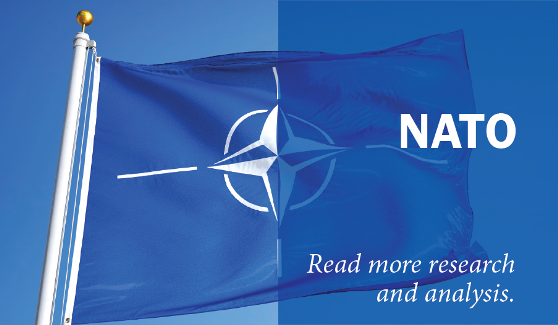John Manza Gives NATO an “F” in Projecting Stability
 As a core element of its mission to strengthen transatlantic cooperation, GMF engages the key questions affecting the future of the global Atlantic security architecture. NATO remains an essential transatlantic link and force multiplier for the United States, Europe, and partner nations. Consequently, the future of NATO remains among the West's highest security priorities and a focal point of GMF’s work. Through thorough policy analysis and strategic convening, GMF is able to create a lasting impact on the surrounding dialogue critical to the transatlantic partnership.
As a core element of its mission to strengthen transatlantic cooperation, GMF engages the key questions affecting the future of the global Atlantic security architecture. NATO remains an essential transatlantic link and force multiplier for the United States, Europe, and partner nations. Consequently, the future of NATO remains among the West's highest security priorities and a focal point of GMF’s work. Through thorough policy analysis and strategic convening, GMF is able to create a lasting impact on the surrounding dialogue critical to the transatlantic partnership.
John Manza is deputy assistant secretary general for Operations at NATO. Lélia Rousselet, research and program coordinator at GMF in Paris, interviewed him in Berlin on December 8, at GMF's annual scenario exercise, as part of the Transatlantic Security and the Future of NATO project.
Q: What will be the main topic of discussions among NATO Allies in the coming months?
John Manza: The main challenge for NATO is to deliver on the two objectives defined at the Warsaw Summit in 2016; these are Deterrence and Defense and Projecting Stability. Deterrence and Defense is the most fundamental aspect of NATO business and revolves around our ability to deter and, if necessary, defend Allied territory against an attack by a peer rival. We have a lot of work to do in Deterrence and Defense, especially in the preparation of Alliance conventional forces. Well-trained and equipped conventional forces are required in order to give our political leaders a full range of options in times of crisis. A failure to field credible conventional forces limits the ability of our political leaders to respond in a crisis situation and places an over-reliance on the nuclear deterrent. Right now, if I were to give us a school grade on conventional Deterrence and Defense, I would give us a “D minus.” We have taken several steps to increase readiness and to forward deploy troops in the Baltic States, but these actions are not sufficient.
Projecting Stability is a concept that recognizes the need for NATO to have stable neighbors on our periphery. Fragile, failed, and conflict-ridden states on NATO’s borders are a threat to our populations at home. This threat can be seen every day through uncontrolled migration and terrorism. NATO can play a stronger role in training local forces in these troubled states and in building their security institutions. Right now, we are not doing enough and I would give us an “F” in Projecting Stability. I am hopeful, though, that in the months ahead we will see NATO’s political leaders deciding to do more to project stability outside of NATO’s borders.
Q: What would be the worst-case scenario for the Alliance in the years to come?
John Manza: The worst-case scenario would be that deterrence fails, and triggers an Article 5 response. The risk is that we will not be able to respond to a threat from a peer rival in a credible manner. To deter a peer rival, the Alliance needs substantial forces on high readiness. A credible deterrent force is required to make those who would think of attacking an Ally question their chances of success. Deterrence is likely to fail if an adversary believes that he can achieve victory with limited costs. This is the core mission of NATO: to deter an adversary from attacking Allied territory.
Q: If you had one piece of advice to give to the leaders of NATO Allied countries, what would it be?
John Manza: My advice would be to increase the readiness of NATO forces, and to make sure that they are well equipped. Following the collapse of the Soviet Union, many Allies cut conventional combat power from their military forces. This was understandable, because the threat had been so greatly reduced. The world, though, is not static and in response to the changing environment we need to be able to adapt, to be agile. Adaptation is essential in facing new threats, whether they be from a peer rival or failing, failed and conflict-ridden states. We must be strong conventionally to deter and, if necessary, defeat a peer rival and we must ensure that those neighbors on our southern borders are stable. Neither of these tasks is easy or cheap, but to ensure the safety and prosperity of our people, we must succeed in both.